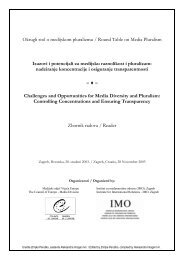almanac on security sector oversight in the Western Balkans
almanac on security sector oversight in the Western Balkans
almanac on security sector oversight in the Western Balkans
You also want an ePaper? Increase the reach of your titles
YUMPU automatically turns print PDFs into web optimized ePapers that Google loves.
dom<strong>in</strong>antly discussed from collectivist and ethno-nati<strong>on</strong>alist perspectives. Informati<strong>on</strong><br />
about which <strong>security</strong> actor is <strong>in</strong> charge of which doma<strong>in</strong>, what <strong>the</strong>ir competencies are,<br />
who c<strong>on</strong>trols different actors and what <strong>the</strong>ir budgets are is not openly available. This<br />
lack of transparency impedes nati<strong>on</strong>al <strong>oversight</strong> of <strong>the</strong> <strong>security</strong> <strong>sector</strong> (<strong>in</strong>clud<strong>in</strong>g by<br />
civil society) and impedes c<strong>on</strong>fidence build<strong>in</strong>g necessary for regi<strong>on</strong>al <strong>security</strong> cooperati<strong>on</strong>.<br />
Hence, an impartial mapp<strong>in</strong>g of <strong>the</strong> <strong>security</strong> <strong>sector</strong> <strong>in</strong> each <strong>Western</strong> Balkan<br />
country was an <strong>in</strong>tegral early stage of <strong>the</strong> project, to facilitate <strong>the</strong> later process of<br />
measur<strong>in</strong>g and grad<strong>in</strong>g.<br />
The <strong>Western</strong> Balkan societies do not have a l<strong>on</strong>g traditi<strong>on</strong> of citizen participati<strong>on</strong> <strong>in</strong><br />
<strong>the</strong> <strong>oversight</strong> of <strong>security</strong> <strong>sector</strong> governance. As a c<strong>on</strong>sequence, traditi<strong>on</strong>al <strong>security</strong> actors<br />
have more expertise and credibility than most civil society organisati<strong>on</strong>s. We hope<br />
to use our Index of SSR to c<strong>on</strong>tribute to <strong>the</strong> <strong>in</strong>creased visibility of civil society organisati<strong>on</strong>s<br />
<strong>in</strong> <strong>security</strong> policy communities, as well as <strong>the</strong>ir <strong>in</strong>creased credibility am<strong>on</strong>gst<br />
<strong>the</strong> general public. Therefore, we expect that putt<strong>in</strong>g forward empirical evidence will<br />
help create an envir<strong>on</strong>ment for debate based <strong>on</strong> rati<strong>on</strong>al arguments and replicable<br />
research. Any recommendati<strong>on</strong>s made based up<strong>on</strong> our research ga<strong>in</strong>s credibility from<br />
<strong>the</strong> fact that our evidence was collected <strong>in</strong> a systematic manner us<strong>in</strong>g clear benchmarks<br />
for <strong>the</strong> success or failure of SSR.<br />
13 . Challenges<br />
The major challenges of implement<strong>in</strong>g this methodological framework have been: dependency<br />
<strong>on</strong> public sources, aggregat<strong>in</strong>g grades for entire <strong>sector</strong>s and acquir<strong>in</strong>g comprehensive<br />
understand<strong>in</strong>gs of <strong>security</strong> <strong>sector</strong> actors’ dist<strong>in</strong>ctive features.The amount<br />
of data available and <strong>the</strong> types of sources used, and c<strong>on</strong>sequently <strong>the</strong> grades given,<br />
were often <strong>in</strong>dicative of <strong>the</strong> level of transparency <strong>in</strong> <strong>the</strong> work of different <strong>security</strong> <strong>sector</strong><br />
actors. Instituti<strong>on</strong>s which granted researchers access to data ga<strong>in</strong>ed an opportunity<br />
to make potential progress <strong>in</strong> <strong>the</strong>ir reform known to <strong>the</strong> public and <strong>the</strong>refore to be<br />
assessed more thoroughly. On <strong>the</strong> o<strong>the</strong>r hand, n<strong>on</strong>-transparent <strong>in</strong>stituti<strong>on</strong>s risked hav<strong>in</strong>g<br />
<strong>the</strong> changes <strong>the</strong>y had made pass unnoticed by <strong>the</strong> public, result<strong>in</strong>g <strong>in</strong> lower grades<br />
due to <strong>the</strong> lack of available data. For example, dur<strong>in</strong>g <strong>the</strong> first cycle of <strong>the</strong> Serbian<br />
case study <strong>the</strong> M<strong>in</strong>istry of Interior, <strong>in</strong>telligence agencies, judiciary and pris<strong>on</strong>s all failed<br />
to provide <strong>the</strong> number of <strong>the</strong>ir employees, nor did <strong>the</strong>y provide any data <strong>on</strong> human<br />
resources management. The researchers tried to overcome this problem by collect<strong>in</strong>g<br />
data from sec<strong>on</strong>dary sources and by triangulati<strong>on</strong> with media sources. C<strong>on</strong>sequently,<br />
<strong>the</strong> grades for <strong>the</strong>se actors were lower than for o<strong>the</strong>r actors that provided required<br />
data or made it available <strong>on</strong> <strong>the</strong>ir websites.<br />
The most difficult challenge has been aggregat<strong>in</strong>g f<strong>in</strong>d<strong>in</strong>gs at <strong>the</strong> <strong>sector</strong> level. This requires<br />
advanced understand<strong>in</strong>g of <strong>in</strong>dividual actors (e.g. police, military, <strong>in</strong>telligence,<br />
PSCs, etc.) and <strong>the</strong>ir <strong>in</strong>terplay. As background literature and empirical data is more<br />
available for traditi<strong>on</strong>al <strong>security</strong> providers, f<strong>in</strong>al research f<strong>in</strong>d<strong>in</strong>gs c<strong>on</strong>ta<strong>in</strong> disproporti<strong>on</strong>ally<br />
more data and analysis for <strong>the</strong>se two ‘usual suspects’ than for o<strong>the</strong>r actors. It<br />
has proven almost impossible to collect data <strong>on</strong> n<strong>on</strong>-statutory actors (e.g. private se-<br />
262



